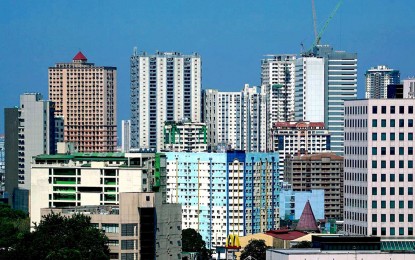
ECONOMIC GROWTH. High-rise buildings dot the skyline of Quezon City on May 9, 2024, as viewed from Eton Centris5 Building. The Philippine Statistics Authority on Wednesday (Aug. 7, 2024) said first-quarter economic growth was revised upward to 5.8 percent from 5.7 percent. (PNA photos by Ben Briones)
MANILA – Speaker Martin Romualdez on Thursday said the 6.3 percent growth of the Philippine economy in the second quarter of 2024 reflects the "effectiveness" of President Ferdinand R. Marcos Jr.'s strategic economic policies amid global headwinds.
In a statement, Romualdez welcomed the country's economic trajectory as an "encouraging development" driven by the collaborative efforts between the executive and legislative branches of government.
“The 6.3 percent economic growth rate shows the effectiveness of President Bongbong Marcos' economic strategies and the solid legislative support of Congress. Our economy is steadily recovering and growing, creating more job opportunities and improved quality of life for Filipinos,” Romualdez said.
Romualdez highlighted the performance of the industry and services sectors--which posted year-on-year growth rates of 7.7 percent and 6.8 percent, respectively--as being crucial for job creation and daily economic activities.
"Ang patuloy na paglago ng mga sektor na ito ay patunay ng tiwala ng mga Pilipino sa ating ekonomiya at sa kinabukasan ng bansa (The continuous growth of these sectors shows the Filipinos' trust in our economy and the future of our country)," he said.
Romualdez also noted the 4.6-percent increase in household consumption, which indicates a boost in consumer confidence and spending.
He pointed out that government spending surged by 10.7 percent, reflecting the administration’s commitment to public services and infrastructure development.
“Our government’s focus on infrastructure projects and public services is paying off. The substantial growth in government spending underscores our dedication to building a better future for all Filipinos,” he said.
Romualdez said the construction sector, with a 16-percent rise, created numerous jobs and laid the foundation for long-term economic prosperity.
He, meanwhile, reiterated the government's commitment to supporting the agriculture sector to ensure the resilience and productivity of farmers and fisherfolk, considering that the sector contracted by 2.3 percent due to the El Niño phenomenon.
He also stressed the need to enhance the country's global competitiveness given the 4.2-percent decline in exports.
Romualdez reaffirmed the House's commitment to working closely with the executive branch to implement policies that will maintain and accelerate this growth momentum.
“We stand united with the executive branch, determined to implement policies that perpetuate this growth momentum,” he said.
“These stellar economic indicators for the second quarter of 2024 are a testament to the indomitable spirit and diligence of the Filipino people, alongside the strategic economic policies of President Bongbong Marcos and the legislative support of Congress,” he added.
PH economy remains robust under PBBM
House Ways and Means Committee chairperson Joey Salceda said the Philippine economy under President Marcos remains robust and "to some extent, immune" from global conditions.
Salceda said one source of the country's faster growth pace is the gross capital formation increasing at a remarkable 11.5 percent.
"The shorthand for that is simple: investment. The private sector sees the continued growth potential of the Philippines and is locking in," he said.
He attributed this development to the enactment of the Public-Private Partnership (PPP) Code, which has stimulated investment in infrastructure, especially in the local sector.
"The aggregates are yet to come in, but there is anecdotal evidence to suggest PPPs in the local sector have been unleashed by clearer, simpler rules on procurement and bidding," he said.
Salceda expressed optimism that the government will meet its growth targets this year, as he called for accelerated spending and approvals for PPP projects.
"Overall, the prospects remain strong and positive despite global challenges," he said.
Salceda highlighted a "surprising amount" of manufacturing growth related to the creatives sector, particularly the printing and reproduction of recorded media at 43 percent as well as the manufacture of furniture at 26.2 percent.
"I believe in the future of this sector, that is why I fought hard, as Chairman of the House panel, to keep the earmarking of 5 percent of revenues from the upcoming VAT (value added tax) on foreign digital services towards the creatives sector. It is often mistakenly said the creatives sector will improve the services sector primarily. There are downstream industries in manufacturing that are inextricably linked to the creatives sector," he said.
‘All-time-low’ unemployment rate
Trabaho Party-list spokesperson Atty. Filemon Javier lauded the administration's economic policies as the government achieved the second highest growth domestic product (GDP) growth in the world during the second quarter of 2024.
Javier said President Marcos' direction to strengthen the economy was essential despite inheriting various challenges from the previous administration.
Javier also pointed out that the Marcos administration achieved another historic "all-time-low" unemployment rate of 3.1 percent.
He said the 96.9 percent employment rate is another milestone reached due to the administration's agenda to improve job quality, push for decent wages, and provide more non-wage benefits.
He noted the crucial role of the “Build Better More” infrastructure program after the Philippine Statistics Authority reported that the huge job growth was a result of a “construction boom.”
Javier said more policies should be created to control inflation and improve the quality of jobs, which were tagged as “most urgent national concerns” according to the recent surveys. (PNA)
